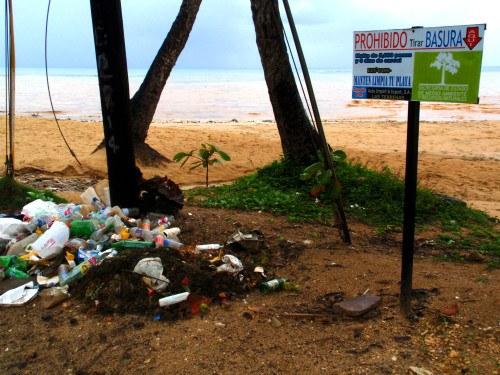
JetBlue has been in the news a lot lately for its announcement that generous leg room and free checked bags will be a thing of the past, but at least this popular airline could make progress on another front. Last week the company, partnering with the Ocean Foundation, released a report that links ecosystem sustainability and revenue.
Much of JetBlue’s business relies on vacation travelers who venture to the Caribbean. Arguably, locals benefit from the influx of tourists as well, though whether local economies can really stay resilient is open to debate. What is not open to debate is that along with American and Canadian dollars, euros and pounds comes heaps of trash. According to The Ocean Foundation, that is 100 million pounds of garbage annually, which often ends up in local water streams, dumps and of course, the sea. With tourism only increasing—especially with the lifting of the U.S. embargo on Cuba—there is a risk that increased environmental degradation could cause an economic drag on the region as well.
With almost 90 percent of trash in the Caribbean traceable to the tourist sector, something has to be done. Almost two years ago, JetBlue and The Ocean Foundation started a partnership to see whether there was a connection between nature (as in clean beaches) and RASM (industry revenue per available seat mile). Many variables were considered, including health coral and mangroves, water quality and clean beaches.
Cutting through the jargon, while the study could not determine a definite causation, researchers did find a strong correlation between some environmental factors and the airlines’ favorite metric, RASM. Mangrove health actually showed the strongest correlation, which should not be too surprising when considering they serve as an important filter along with any wetlands ecosystem. Beach trash was a close second: nobody wants to be surrounded by beer cans and cigarette butts, though tourist literature does a pretty good job photoshopping those out before they are published online and in brochures. Water quality came in at number three.
What does this all mean? One bane of the environmental movement is that it has always been difficult to assign quantitative values to qualitative arguments. Sure, one does not need to be a scientific whiz to understand that water depletion, coral reef destruction and excess trash are long term threats to businesses both local and multinational. Businesses are already starting to take environmental threats more seriously—but more reliable data is needed to make the case to those who make decisions based on what they see in a ledger. But advocates who are passionate about cleaning up our oceans also admit solid data on how much trash is out there is still relatively sparse. The Ocean Foundation wants to build on this effort and also tie it revenues in other segments of the travel industry—hotel revenues could be the next focus of research.
To those within the environmental movement who have a take-charge approach to cleaning up the oceans, such a study with a result that calls for more studies may not elicit much more than an eye roll. But if more rigorous data can really help us understand the financial impact of our collective trashing of the planet, more research similar to what JetBlue and The Ocean Foundation are churning out could pay more dividends in the long run.
Image credit: JetBlue via Jackie Marks Marine Photobank
After a year in the Middle East and Latin America, Leon Kaye is based in California again. Follow him on Instagram and Twitter. Other thoughts of his are on his site, greengopost.com.

Leon Kaye has written for 3p since 2010 and become executive editor in 2018. His previous work includes writing for the Guardian as well as other online and print publications. In addition, he's worked in sales executive roles within technology and financial research companies, as well as for a public relations firm, for which he consulted with one of the globe’s leading sustainability initiatives. Currently living in Central California, he’s traveled to 70-plus countries and has lived and worked in South Korea, the United Arab Emirates and Uruguay.
Leon’s an alum of Fresno State, the University of Maryland, Baltimore County and the University of Southern California's Marshall Business School. He enjoys traveling abroad as well as exploring California’s Central Coast and the Sierra Nevadas.














